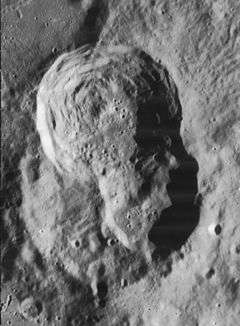Hainzel (crater)
|
Lunar Orbiter 4 image, with Hainzel at bottom, Hainzel C below right of center, and Hainzel A above center | |
| Coordinates | 41°18′S 33°30′W / 41.3°S 33.5°WCoordinates: 41°18′S 33°30′W / 41.3°S 33.5°W |
|---|---|
| Diameter | 70 km |
| Depth | 3.0 km |
| Colongitude | 34° at sunrise |
| Eponym | Paul Hainzel |
Hainzel is the southern member of a trio of overlapping lunar craters. The composite rim is located at the west edge of Lacus Timoris in the southwest sector of the Moon. The heavily worn crater Mee is attached to the southwest wall; its rim forms a ridge running from the south of the Hainzel formation.
Hainzel forms the south portion of the grouping, and is overlain by Hainzel C to the northeast, and then by Hainzel A in the north. Hainzel A is the most intact and also the youngest of the cluster. The wall between Hainzel and Hainzel C is the most intact of the interior rims, forming a promontory from the southeast wall. Both Hainzel A and C have central peaks.
Satellite craters
By convention these features are identified on lunar maps by placing the letter on the side of the crater midpoint that is closest to Hainzel.
| Hainzel | Latitude | Longitude | Diameter |
|---|---|---|---|
| A | 40.3° S | 33.9° W | 53 km |
| B | 38.0° S | 33.4° W | 15 km |
| C | 41.1° S | 32.8° W | 38 km |
| G | 37.5° S | 33.0° W | 5 km |
| H | 37.0° S | 33.1° W | 11 km |
| J | 37.8° S | 37.8° W | 13 km |
| K | 37.5° S | 32.3° W | 14 km |
| L | 38.1° S | 34.9° W | 16 km |
| N | 42.6° S | 40.2° W | 24 km |
| O | 38.6° S | 38.6° W | 14 km |
| R | 38.7° S | 36.4° W | 19 km |
| S | 41.1° S | 37.7° W | 8 km |
| T | 40.2° S | 37.2° W | 8 km |
| V | 41.3° S | 38.7° W | 20 km |
| W | 40.6° S | 38.7° W | 31 km |
| X | 36.7° S | 36.8° W | 5 km |
| Y | 40.8° S | 39.9° W | 22 km |
| Z | 37.7° S | 35.4° W | 5 km |
References
- Wood, Chuck (2006-10-06). "A Very Tormented Floor". Lunar Photo of the Day. Retrieved 2006-10-06.
- Andersson, L. E.; Whitaker, E. A. (1982). NASA Catalogue of Lunar Nomenclature. NASA RP-1097.
- Blue, Jennifer (July 25, 2007). "Gazetteer of Planetary Nomenclature". USGS. Retrieved 2007-08-05.
- Bussey, B.; Spudis, P. (2004). The Clementine Atlas of the Moon. New York: Cambridge University Press. ISBN 978-0-521-81528-4.
- Cocks, Elijah E.; Cocks, Josiah C. (1995). Who's Who on the Moon: A Biographical Dictionary of Lunar Nomenclature. Tudor Publishers. ISBN 978-0-936389-27-1.
- McDowell, Jonathan (July 15, 2007). "Lunar Nomenclature". Jonathan's Space Report. Retrieved 2007-10-24.
- Menzel, D. H.; Minnaert, M.; Levin, B.; Dollfus, A.; Bell, B. (1971). "Report on Lunar Nomenclature by the Working Group of Commission 17 of the IAU". Space Science Reviews. 12 (2): 136–186. Bibcode:1971SSRv...12..136M. doi:10.1007/BF00171763.
- Moore, Patrick (2001). On the Moon. Sterling Publishing Co. ISBN 978-0-304-35469-6.
- Price, Fred W. (1988). The Moon Observer's Handbook. Cambridge University Press. ISBN 978-0-521-33500-3.
- Rükl, Antonín (1990). Atlas of the Moon. Kalmbach Books. ISBN 978-0-913135-17-4.
- Webb, Rev. T. W. (1962). Celestial Objects for Common Telescopes (6th revised ed.). Dover. ISBN 978-0-486-20917-3.
- Whitaker, Ewen A. (1999). Mapping and Naming the Moon. Cambridge University Press. ISBN 978-0-521-62248-6.
- Wlasuk, Peter T. (2000). Observing the Moon. Springer. ISBN 978-1-85233-193-1.
